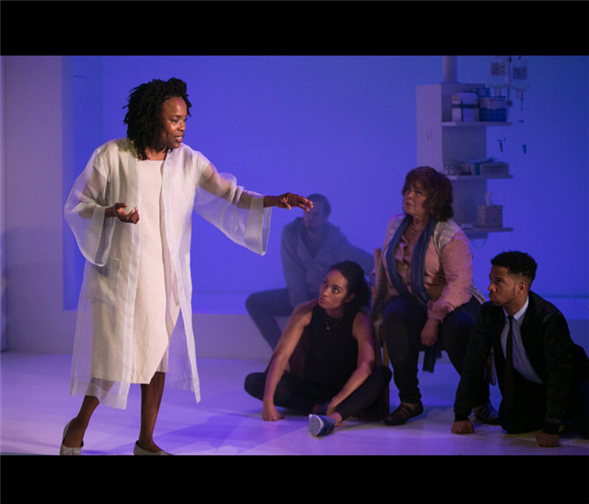Translate Page

In his new play, Branden Jacobs-Jenkins pushes definitions of race and family
---
In a 2014 interview with Vogue, Branden Jacobs-Jenkins states, "My plays have these titles that are oddly tricky. I like that something can look like one thing, but mean two different things."
His new play WAR – now at LCT3 – continues the trend. In English, the title conjures images of fighting and bullets, but in German the word is a verb, meaning "was." Plus, Germans pronounce "war" the same way they pronounce "wahr," which translates to English as "true."
Fighting, the past, the truth: all these concepts resonate in Jacobs-Jenkins's play.
The show begins with a family in crisis. Roberta, the matriarch, has had a stroke, and her daughter Joanne nervously waits in the hospital room for her brother Tate, whose fire and political savvy are matched only by his love for his mother. Joanne is sitting with Elfriede, who unbeknownst to Joanne or Tate is Roberta's half-sister from Germany. The German woman's presence is loaded with buried history and family secrets.
It matters, too, that these newly acquainted family members differ racially and experienced different national attitudes toward race and racism. Jacobs-Jenkins uses their relationships to interrogate what both family and blackness mean from a variety of different perspectives.
"This play came from my experience working on Appropriate," he says, referring to his 2014 drama about a white family that stumbles upon its legacy of slave ownership. "I left that one being like, 'Well, what is the black family drama? What makes a person black on stage?' At some level I was trying to deconstruct that through the composition of the family. And [in WAR] there's a half-black person and a quarter-black person, and where do we begin to see some boundaries of order?"
{Image1}
Boundaries also blur in Roberta's unconscious, which the play lets us see. Who is she? Who is her family? Does someone need her? As Roberta struggles to re-constitute her own memories, she is aided by the alpha male of a mysterious group of primates.
Her mental landscape grows more complex as the show goes on. "For the first full third of the play, she's in this sort of childlike state of pure being, and as the show moves on, you get into this baggage of life and family and politics and personal politics," the playwright says, noting that like the other characters, Roberta grapples with the legacy of her family, the decisions she's made, her own genetic history, and the racial dynamics of her ever-diversifying family.
For Jacobs-Jenkins, these characters searching their own histories reflect his own deconstruction of the legacy of the black family drama. "I think a lot about the narratives that live in the theatre about blackness and black families," he says. "And for so long, I had this bone to pick with August Wilson because there's no one in his plays born past 1972 or something like that. So none of those experiences of the 20th century count beyond that? Like, what are we talking about here? Why is everybody black in Pittsburgh? [People are] always talking about a thing like 'the black experience' as opposed to a black experience or some black experiences. That's the trickiness of the label that I try to take on somewhat in WAR."
As with his titles, Jacobs-Jenkins asks his audience to think about the full range of what this family, this narrative, and the concept of blackness can mean. But he's aware of all the perspectives his play doesn't tackle. "It's ultimately about people trying to decide what a family means to them," he says. "It's like a rabbit hole."
---
Taylor Barfield is a writer and dramaturg based in Chicago.
Photos by Erin Baiano. Top photo: The cast of WAR.
TDF Members: Go here to browse our current offers for theatre, dance, and concerts.